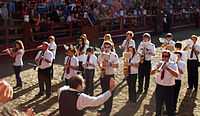Pasodoble


Pasodoble, or paso doble, (literal meaning in Spanish: double-step) is a Spanish and Portuguese light music, with a binary rhythm and moderated movement, probably based in typical Spanish dances of the 16th century. During the 18th century it was incorporated to comedies and was adopted as a regulatory step for the Spanish infantry, with a special feature that makes the troops can take the regular step: 120 steps per minute. The music was introduced in bullfights during the 19th century. It is played during the bullfighters' entrance to the ring (paseo) or during the passes (faena) just before the kill. It corresponds to the pasodoble dance (traditional and ballroom).
The traditional couple's dance was originated in France and then adopted in Spain and Portugal.
Pasodoble is a lively style of dance to the duple meter march-like pasodoble music. It is modelled after the sound, drama, and movement of the Spanish and Portuguese bullfight.
Famous bullfighters have been honoured with pasodoble tunes named after them. Other tunes have been inspired by patriotic motifs or local characters.
Famous Spanish pasodobles
- Amparito Roca
- El Beso
- El gato montés ("Wild Cat") from the opera with the same name
- El Relicario
- Agüero
- España Cañí ("Gypsy Spain")
- Islas Canarias named after Canary Islands.
- La Gracia de Dios[1]
- Feria de Manizales (unofficial hymn of the Colombian city, Manizales)
- Manolete, named after Manolete.
- La Morena de mi Copla
- Plaza de las Ventas
- Paquito el Chocolatero. The tune has a dance of its own.
- Sombreros y Mantilles
- Suspiros de España
- Que Viva España
- Valencia
- La Virgen de la Macarena
Mexican pasodobles
El Piti, El Charro Cárdenas, El 11-81, San Antonio de Triana, Fermincito, Lorenzo Garza, El abuelito, El banderillero, María Caballé, El Berrendito de San Juan, Tarde de toros, Por tapatías, Toros en San Miguel, Rodolfo Gaona, Joselito Huerta, Toros de Llaguno, La Macarenita.
By Agustín Lara: Silverio Pérez, El Novillero, Fermín.
Dance
Traditional

Pasodoble is based on music played at bullfights during the bullfighters' entrance (paseo) or during the passes (faena) just before the kill. The leader of this dance plays the part of the matador. The follower generally plays the part of the matador's cape, but can also represent the shadow of the matador, as well as the bull or a flamenco dancer in some figures. Its origin dates back to a French military march with the name “Paso Redoble.” This was a fast paced march, which is why this is a fast-paced Latin American dance modeled after the Spanish bull fight. Bull fighting was well-known around this time.
Ballroom
A significant number of Paso Doble songs are variants of España Cañi. The song has breaks in fixed positions in the song (two breaks at syllabus levels, three breaks and a longer song at Open levels). Traditionally Paso Doble routines are choreographed to match these breaks, as well as the musical phrases. Accordingly, most other ballroom Paso Doble tunes are written with similar breaks (those without are simply avoided in most competitions).
Because of its inherently choreographed tradition, ballroom Paso Doble for the most part is danced only competitively, almost never socially — or at least not without sticking to some sort of previously learned routine. This said, in Spain, France, Vietnam, Colombia, Costa Rica and some parts of Germany it is danced socially as a lead (not choreographed) dance. In Venezuela, Paso Doble is almost a must in weddings and big parties, being especially famous by the song "Guitarra Española" by Los Melódicos.
In competitive dance, modern pasodoble is combined with other four dances (Samba, Cha-cha-cha, Rumba and Jive) under the banner International Latin. Modern pasodoble dance consists of two dancing parts and one break in between for dancers of class D and of three parts and two breaks in between for dancers of class C, B, A, according to the IDSF classification.[2] Dancers of lower than D-class usually perform only four official dances of Latin-American Program.

See also
Notes
- ↑ Berenguer Gonzalez, Ramón T. "La Gracia de Dios" Pasodoble Mp3·Authorized Version
- ↑ http://www.worlddancesport.org/
External links
- Amparito Roca Video http://www.youtube.com/watch?v=OcnQqK6-qCc
- Maestro Manuel Lillo 'Plaza de las Ventas' Score
| ||||||||||||||||||||||||||
| ||||||||||||||||||||||||||||||||||||||||||||||||||||||